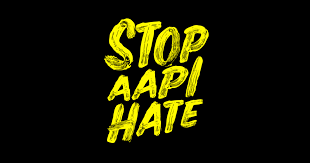Opinion: Atlanta shooting brings rise to overdue condemnation against AAPI violence

April 6, 2021
For over a year now, the Asian American and Pacific Islander (AAPI) community has faced documented cases of hate crimes including verbal, mental and physical abuse. This is largely attributed to “Asian virus” or “Chinese virus” slurs that had been frequented by former President Donald Trump and his supporters in reference to the coronavirus. If a leader pushes his people to adopt these ethnic slurs, violence, in the eyes of a supporter, could very well embody their loyalty.
This same violence was demonstrated on March 16 in the Atlanta-area shooting rampage that killed eight people. Six of the victims were Asian women.
As the shooting displays concerns of race and gender-based violence, the 21-year-old suspect has since claimed addiction and other mental health issues as his underlying motive leading up to the incident.
Law Enforcement Reporter for New York Times, Nicole Hong, explained the difficulty in classifying violent acts against the AAPI community as hate crimes under U.S. law. Absence of verbal aggression, condemning the victim’s race, ethnicity, origin, etc. creates a grey area and raises the question: “How much did race play a factor?” Law enforcement is, thus, unable to qualify a hate crime without this verbal affirmation because of its inability to further support these charges in court.
Similarly, the lack of an anti-Asian symbol makes these allegations increasingly difficult to prove. History has shown the role that symbols can play in similar hate crimes. For example, Hong examines the Swastika as a key determination in anti-semitic crimes.
While deep-rooted, racial motive in the Georgia shooting has not been explored due to the absence of symbolic and/or verbal affirmation, dismissing race as a factor ignores the impact of blaming a race or even a country for the pandemic rather than specific actions or individuals.
Instead, the shooting surfaces long-overdue conversation surrounding anti-Asian violence, largely produced by this same hateful rhetoric. Researchers call this language the “Trump effect,” says founder and director of demographic data and policy research nonprofit AAPI Data, Karthivk Ramakrishnan.
As the College of DuPage launches forums identifying ways to have productive conversations about diversity and race while identifying personal bias, it must also uphold these same standards in condemning acts of racial violence, particularly against the AAPI community.
As this violence continues to heighten, awareness and support for the Asian community, including the 11% of COD students who identify as Asian, is essential now, more than ever. While the lack of immediate action from the college may have lessened the magnitude of the statement, David Goldberg, College of DuPage Faculty Association president, writes it off as the first institution-wide effort to condemn these violent acts. He is hopeful that, in the future, this can be improved upon in accordance with the Board of Trustees and President Brian Caputo.
“In my sense, and I think many of my colleagues’ senses, you cannot have a sincere conversation about equity and access if you are not also condemning race and gender-based violence that are mass shootings. That rings hollow,” said Goldberg. “Anything that is not seriously linking the intersectionality of these things and then talking about what happens in our college and across the country is untrue to me. The tone of it [the college’s statement] and some of the phrases being linked to the values that the college puts on its website is a good start. I think it is overdue, but I think it is a good start.”
While this statement must reflect the institution and its values, it is not limited to that. It must also become a launching point for critical conversations in and around the classroom on systemic and institutionalized violence and hate. Anything asymmetrical to the college’s explicit core values is failing the community and Asians suffering from these issues.
Historically, World War II brought rise to anti-German violence and Japanese-American internment camps alongside anti-Irish sentiment created during early immigration in America, but that time is not now. Current numbers show alarming, intensified violence against Asians. While we uphold realities of other communities, the focus on AAPI hate does not have to be diluted in exchange.
Report violence against the Asian American and Pacific Islander (AAPI) community. Stand in solidarity with them, and #StopAAPIHate.
On a recent Courier survey, students and community members shared their thoughts on a College of DuPage statement addressing this race and gender-based violence nine days subsequent to the Atlanta-area shooting. Read the responses here.




















Joe Prendergast • Apr 6, 2021 at 3:35 pm
I think there is a difference between blaming the disastrous spread of COVID-19 on China, and somehow blaming all Asian people for it. We should hold China accountable. When I say China, I, of course, do not mean the people of China or innocent people of Chinese descent. I mean the tyrannical and oppressive Chinese government controlled by the Chinese Communist Party. For the sake of the people of China, including the Uyghur Muslims, and the rest of the world, we should not let the CCP gain more power over the people of China and the world. Attacking innocent Asian people is counterproductive to holding the Chinese government accountable, and just plain wrong. We should not let the COVID-19 pandemic split us apart, but rather bring us all together, no matter what you look like or where your ancestors were from, against tyranny and the threats posed to our freedoms as Americans and as humans,